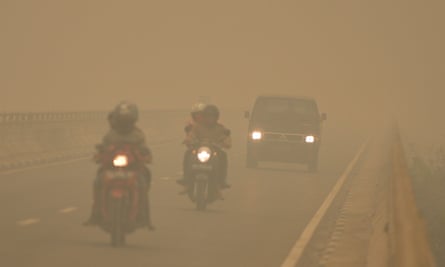Raging forest fires across Indonesia are thought to be responsible for up to half a million cases of respiratory infections, with the resultant haze covering parts of Malaysia and Singapore now being described as a “crime against humanity”.
Tens of thousands of hectares of forest have been alight for more than two months as a result of slash and burn – the fastest and quickest way to clear land for new plantations.
Indonesia is the world’s largest producer of palm oil and fires are frequently intentionally lit to clear the land with the resulting haze an annual headache.
But this year a prolonged dry season and the impact of El Niño have made the situation far worse, with one estimate that daily emissions from the fires have surpassed the average daily emissions of the entire US economy.
The fires have caused the air to turn a toxic sepia colour in the worst hit areas of Sumatra and Kalimantan, where levels of the Pollutant Standard Index (PSI) have pushed toward 2,000. Anything above 300 is considered hazardous.
Endangered wildlife such as orangutans have also been forced to flee the forests because of the fires.
Six Indonesian provinces have declared a state of emergency.
Across the region Indonesia’s haze crisis has been causing havoc – schools in neighbouring Singapore and Malaysia have been shut down, flights have been grounded, events cancelled and Indonesian products boycotted, as millions try to avoid the intense smoke.
In the worst affected parts, on Sumatra and Kalimantan, ten people have died from haze-related illnesses and more than 500,000 cases of acute respiratory tract infections have been reported since July 1.

Sutopo Puro Nugroho, the spokesperson for the Meteorology, Climatology and Geophysics Agency (BMKG) has acknowledged that for months 43 million people on the two islands have been inhaling toxic fumes. Yet, he admitted, the number of unrecorded cases was likely much higher.
“This is a crime against humanity of extraordinary proportions,” he said. “But now is not the time to point fingers but to focus on how we can deal with this quickly.”
As the Indonesian Council of Ulema has held mass prayers for rain, the administration of President Joko Widodo has deployed 30 aircraft and 22,000 troops to fight the fires on the ground, as well as stationed several warships off Kalimantan, on standby to evacuate victims if required.
Malaysia, Singapore, Australia and Japan have also sent assistance.
But environmentalists have warned that the measures, a few helicopters, water bombers and face masks, are far from sufficient.

“Large parts of Indonesia have now been in a state of emergency for over a month. Why has there not been a nationally declared total fire ban advertised 24/7 on all television channels?” asked Dr. Eric Meijaard, an Indonesia-based associate professor at the University of Queensland, in a recent editorial in the Jakarta Globe.
“Why has there not been a clear message: you burn — you go to jail?”
By its own calculation the fires have cost the Indonesian government more than US$30 billion, a huge blow for the country’s floundering economy and the president’s economic development agenda.
Pressure to deal with the raging fires, haze and associated emissions is mounting as Indonesia prepares to discuss its climate commitments at the United Nations Climate Change Conference in Paris this December.





Comments (…)
Sign in or create your Guardian account to join the discussion